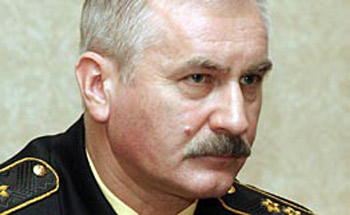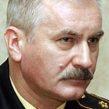
AS UKRAINE LOOKS TOWARD NATO, MOSCOW’S MARITIME INTERESTS SHIFT EASTWARD
Publication: Eurasia Daily Monitor Volume: 4 Issue: 136
By:

Legendary Russian General Alexander Suvorov founded Russia’s Black Sea naval base at Sevastopol in 1783. Since the collapse of communism in 1991, Russia’s presence in the Crimean peninsula has increasingly been a bone of contention between Moscow and Kyiv, and Russia is slowly moving to vacate the centuries-old site in favor of a base located on Russian territory near the Sea of Azov.
The shift will not be cheap, however. Russian naval commander Admiral Vladimir Masorin told a meeting of the Maritime Board of the Russian government in Novorossiysk, “We need to find 25 billion rubles [$980 million] to create the social infrastructure” (Interfax-AVN, July 11). Three piers have already been constructed at a site that will eventually be able to accommodate up to 100 ships (RIA-Novosti, July 10).
The issue of Russia leasing the Sevastopol naval base for approximately $100 million annually has become an increasingly fractious issue for the Ukrainian government of President Viktor Yushchenko, who is seeking closer Western ties and possible eventual Ukrainian entry into NATO.
Russian use of Sevastopol epitomizes the complexity of Ukrainian-Russian relations, as the rent for the facility is currently deducted from Ukraine’s debt to Russia for its energy imports. Disputes between Kyiv and Moscow have periodically flared since the collapse of the Soviet Union in 1991; it took six years (until May 1997) for Russia and Ukraine to sign a “Peace and Friendship” treaty dismissing Russia’s territorial claims against Ukraine. After 1991 Russia initially refused to recognize Ukrainian sovereignty over Sevastopol and the entire Crimean peninsula, maintaining that Sevastopol was never actually incorporated in the Ukrainian Soviet Socialist Republic because of its military base status.
Possible Ukrainian entry into NATO remains a fractious issue with implications extending far beyond Moscow and Kyiv, however. Earlier this week hundreds of protesters from the pro-Russian Progressive Socialist Party picketed regional government offices in Odessa as officials met to discuss Ukraine’s integration with NATO (Itar-Tass, July 11).
Anti-NATO feelings remain substantial in Ukraine, with the pro-Russian Union of Orthodox Christian Citizens of Ukraine stating that it would field up to 100,000 protesters against this month’s joint NATO-Ukraine Sea Breeze-2007 maritime exercise, involving 21 warships and 1,200 NATO troops from 14 countries off Odessa and Mykolayiv. The July 9-22 Sea Breeze exercises epitomize Ukraine’s ambivalent attitudes toward increasing cooperation with the West. Ukraine’s contribution to the exercise is 10 warships, three fighters, eight helicopters, and troops and marines. The decade-old annual training exercise emphasizes shipboard and damage-control training. Nearly 1,000 of the operation’s 2,500 participants are Ukrainian, with the U.S. Navy and Marine Corps deploying about 700 people. The remaining personnel are from Armenia, Azerbaijan, Canada, Georgia, Germany, Greece, Latvia, Macedonia, Moldova, Romania, and Turkey.
While the two countries have increasingly divergent military security perceptions, their economies nevertheless remain tightly linked. Two weeks ago Ukrainian Prime Minister Viktor Yanukovych visited Moscow for bilateral economic discussions with Russian Prime Minister Mikhail Fradkov and discussed next month’s meetings between Presidents Vladimir Putin and Viktor Yushchenko. Ukraine remains Russia’s fifth-largest trading partner. It is Russia’s largest trading partner among the former Soviet republics, with Russia accounting for 30% of Ukraine’s foreign relations. Among major bilateral issues is the fact that most Russian natural gas deliveries to Europe transit Ukraine, a point of economic pressure that Russia has not hesitated to use in the past (RIA-Novosti, June 22).
Grudgingly acknowledging its new strategic relationship with Kyiv, Moscow is also reluctantly planning to abandon its radar bases in Sevastopol and Mukachevo near Ukraine’s border with Slovakia.
While Russia is withdrawing its naval units from Ukraine, its oil revenues have nonetheless boosted its naval ambitions, with Admiral Masorin stating that the Russian fleet will deploy up to six aircraft attack groups within the next 20 years, three of which will be based in the Northern Fleet, with the other three based in the Pacific (Kommersant, July 10). The Pacific deployment is one of the clearest signs that Moscow is increasingly viewing Asia as an area of strategic interest even as it downgrades its traditional European military visibility. As a clear indication of Moscow’s shifting naval ambitions, Masorin stated that the Russian navy will construct a new naval base in Vilyuchinsk on the Kamchatka peninsula. While Moscow seems prepared to downsize its traditional presence in the Black Sea, its attentions are shifting increasingly eastwards away from Russia’s traditional Slavic emphasis toward its incipient Asian destiny.




